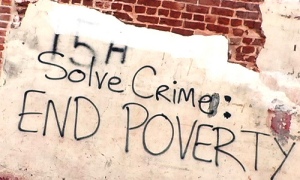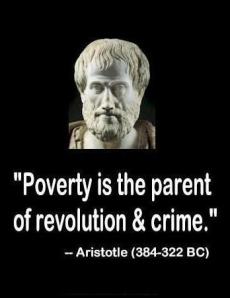by Saurabh Bhattacharjee
“…The appellant had in fact intended to wipe out the whole family including himself on account of abject poverty…this aspect of the matter has not been properly appreciated by both the Sessions Court and the High Court…”- Kurian J, in Sunil Damodar Gaikwad v State of Maharashtra [1]
 Should poverty be considered a relevant factor in assessment of criminal responsibility? Should it be a defence? Should it be only have a role in sentencing? Or would reference to poverty be a complete anathema to criminal responsibility? The recent endorsement by the Supreme Court of India of poverty as one of the mitigating factors in imposition of death penalty calls for renewed attention to these questions raised by Victor Hugo in his novel, Les Misérables.
Should poverty be considered a relevant factor in assessment of criminal responsibility? Should it be a defence? Should it be only have a role in sentencing? Or would reference to poverty be a complete anathema to criminal responsibility? The recent endorsement by the Supreme Court of India of poverty as one of the mitigating factors in imposition of death penalty calls for renewed attention to these questions raised by Victor Hugo in his novel, Les Misérables.
Of Poverty Defence, Autonomy and Responsibility
The central claim of the poverty defence lies in the criminogenic consequences of poverty. Latest insights from behavioural and social sciences research validate the link between poverty and criminal behaviour and establish that poverty is both a risk factor and an immediate stressor.[2] It is argued, therefore, that punishing the poor would be unfair. As Richard Delgado had noted in his seminal piece on the Rotten Social Background excuse:
“An environment of extreme poverty and deprivation creates in individuals a propensity to commit crimes. In some cases, a defendant’s impoverished background so greatly determines his or her criminal behavior that we feel it unfair to punish the individual.”[3]
Criminal responsibility is predicated on the assumption that individuals in general have the capacity and the free will to make meaningful choices.[4] If poverty indeed pre-determines criminal behaviour, then the central assumption of free will and choice cease to apply and as a result, criminal responsibility would stand excluded.[5]
Yet on closer examination, it appears that this proposition cannot be squared with the fundamental tenets of criminal liability. First of all, a correlation between poverty and crime does not by itself establish causation. Indeed, there is little empirical evidence to support a deterministic link between the two.[6] While poverty and persistent deprivation impede choice, affect motivation and provide temptation, they do not suspend the capacity for rational judgment.
fundamental tenets of criminal liability. First of all, a correlation between poverty and crime does not by itself establish causation. Indeed, there is little empirical evidence to support a deterministic link between the two.[6] While poverty and persistent deprivation impede choice, affect motivation and provide temptation, they do not suspend the capacity for rational judgment.
Secondly, mere causation cannot be the basis for an excuse. Indeed, if causation were to excuse criminal liability, no one would ever be responsible for their behaviour at all; for new insights from neuroscience on the constrained nature of free will and autonomy suggest that every person is a product of genetic inheritance and environment.[7]
Thirdly, responsibility, according to the dominant theory of criminal responsibility, must be located at the level of the rational autonomous individual. In other words, a crime is regarded as entirely the product of free and autonomous choice-making by the perpetrator; he or she is seen as fully culpable for it, irrespective of the circumstantial constraints.[8] Such a model of responsibility cannot be reconciled with poverty defence which shifts the locus of responsibility away to social factors.
Poverty, Duress and Necessity
Even if we were to move away from the notion of formal equality of choice and the conceptual objection to poverty-defence, the operationalisation of a poverty defence within the existing general defences to crime would be untenable.
The two common law defences with which poverty has usually been sought to be bracketed are those of duress and necessity.[9] Both these defences constitute an acknowledgment of the notion that culpability of a perpetrator can be lessened by coercion and constrained choices.[10]
Yet, it must be noted that not every coercion or constraint attracts the defence of duress and necessity. An excuse from criminal liability arises only when there is an abnormality or a dysfunction that is so severe that the actor could not reasonably have been expected to remain law abiding.[11] For example in India, Section 94 of the Indian Penal Code is predicated on the condition that the accused must be subjected to threats that cause apprehension of “instant death”. The pressure of economic deprivation does not reach such a level where a reasonable person could be expected to suggest that death would be the immediate alternate consequence.[12]
 Similarly, the defence of necessity, which involves cases where the evil of obeying the letter of the law is socially greater than the evil of breaking it, also requires the harm to be avoided to be so imminent as to justify or excuse the act committed.[13] As stated in the last paragraph, the element of imminent harm cannot arguably be invoked every case of poverty. Moreover, it is implicit in the defence of necessity that it can be invoked only in cases where the perpetrators were so limited in their choice of means to avoid the harm that they had no alternative but to commit the crime. This is a very high threshold for the defence of poverty to cross.
Similarly, the defence of necessity, which involves cases where the evil of obeying the letter of the law is socially greater than the evil of breaking it, also requires the harm to be avoided to be so imminent as to justify or excuse the act committed.[13] As stated in the last paragraph, the element of imminent harm cannot arguably be invoked every case of poverty. Moreover, it is implicit in the defence of necessity that it can be invoked only in cases where the perpetrators were so limited in their choice of means to avoid the harm that they had no alternative but to commit the crime. This is a very high threshold for the defence of poverty to cross.
Not surprisingly, courts across major common law countries have an unspoken consensus across common law countries that systemic poverty cannot be a sufficient ground for invocation of the defence of necessity. For example in the English case of Southwark London Borough Council v Williams,[14] Lord Denning clarified that squatters could not claim a defence of necessity because the peril they found themselves in was “an obstinate and longstanding state of affairs”, rather than an immediate or emergent threat.[15]
Admittedly, there are a few decisions where economic necessity has indeed been endorsed as a defence. A Californian court found in In re Eichorn[16] that a trial court should have allowed a homeless man cited for violating an anti-camping ordinance to assert the necessity defence. Echoes of this proposition can be found in the observations of the Delhi High Court in Ram Lakhan v State[17] where it was held that a person who “takes to begging compelled by poverty and hunger” and charged under an anti-begging statute “would be entitled to invoke the defence of necessity.” It must be noted however that these case related to status offences aimed at ostensible poverty – begging and homelessness, and cannot be read as providing a basis for a wider defence of economic necessity.
Sentencing and Poverty: A Better Fit?
Even as courts from different jurisdictions have recognised that poverty by itself does not satisfy the minimum threshold of the defences of duress and necessity, poverty and economic deprivation are well-accepted as relevant considerations in sentencing.
For example, Justice Sandra O’Connor of the United States Supreme Court ruled in her  concurring opinion in California v. Brown[18] that “defendants who commit criminal acts that are attributable to a disadvantaged background, or to emotional and mental problems, may be less culpable than defendants who have no such excuse.” More recently in Miller v Alabama[19], the United States recognised the importance of rotten social background as a mitigating factor in sentencing for juvenile offenders.
concurring opinion in California v. Brown[18] that “defendants who commit criminal acts that are attributable to a disadvantaged background, or to emotional and mental problems, may be less culpable than defendants who have no such excuse.” More recently in Miller v Alabama[19], the United States recognised the importance of rotten social background as a mitigating factor in sentencing for juvenile offenders.
The Supreme Court of Canada in R v. Gladue[20] held that sentencing judges should take into account the “unique systemic or background factors which may have played a part in bringing the particular aboriginal offender before the courts” including poverty, substance abuse, lack of education, and the lack of employment opportunities for aboriginal people.
In the same vein, the Indian Supreme Court on more than occasion has emphasised on the importance of poverty as a mitigating factor in consideration of death penalty. In Ediga Anamma v State of Andhra Pradesh[21], the Court held that judicial commutation is permissible in cases where the offender suffers from socio-economic, psychic or penal compulsions that are insufficient to attract an exception or a less serious charge.
This receptivity towards poverty as a mitigating factor is in stark contrast to the hostility towards the defence of poverty. But this variance can be explained by the difference in the logic of sentencing from that of conviction. Sentencing arguably reflects an individualised assessment of a person’s culpability. Therefore, it not only permits but also mandates an inquiry into the background of the individual and a consequent departure from the idealized model of treating everyone equally. For instance, in the hearing under Section 235 of Criminal Procedure Code, an accused may provide information on all possible factors which may mitigate the sentence, including his social and personal background;[22] poverty and persistent economic deprivation would constitute one of those background factors that can be referred to.
It has been argued in this regard that “sentencing rhetorically promises to treat individuals equally by pursuing consistency in sentencing”, and at the same time, “allows variations in culpability at the level of the individual offender.”[23] Thus, it is evident that the narrative of poverty as a relevant variable can be better integrated with the logic of sentencing.
The Need for Decriminalisation of Poor
The debate on poverty defence cannot be divorced from the question of criminalisation of poverty. All over the world, poverty and manifestations of poverty – from begging and homelessness to street-vending – are being subjected to control of criminal laws.[24] If we recognise, as empirical evidence indicates, that poverty and persistent deprivation can substantially impair behavioural control and induce lawlessness, then the moral justification for criminalising behaviours that are direct consequence of such deprivation is very suspect. By using the sharp edges of criminal law to meet visible poverty, as Stuart P. Green wrote, “we run the risk of compounding the sins of socio-economic injustice with those of retributive injustice.”[25] A more minimalist use of criminal law would perhaps be as, if not more effective, in addressing the interests that a defence of poverty seeks to serve.
(Saurabh Bhattacharjee is an Assistant Professor of Law at NUJS, Kolkata)
Image courtesy: here, here, here and here. The images do not necessarily reflect the arguments.
[1] Supreme Court of India in Sunil Damodar Gaikwad v State of Maharashtra 2013 Indlaw SC 572.
[2] Craig Haney, Evolving Standards of Decency: Advancing the Nature and Logic of Capital Mitigation, 36 Hofstra L. Rev. 835, 856-865 (2008).
[3] Richard Delgado, “Rotten Social Background”: Should the Criminal Law Recognize a Defense of Severe Environmental Deprivation? 3 Law & Inequality 9, 54 (1985).
[4] Andrew Ashworth, principles of Criminal Law 27 (1999).
[5] Barbara Hudson, Punishment, Poverty and Responsibility: The Case for Hardship Defence, (1999) 8(4) Social and Legal Studies 584-585.
[6] Paul Robinson, Are We Responsible for Who We Are? The Challenge for Criminal Law Theory in the Defenses of Coercive Indoctrination and “Rotten Social Background”, 2 Ala. C.R. & C.L. Rev. 53, 59 (2011).
[7] Michele E. Gilman, The Poverty Defense, 47 U. Rich. L. Rev. 495, 505 [2013].
[8] Haney, supra n. 2.
[9] Antonia K. Fasanelli, Note in Re Eichorn: The Long Awaited Implementation of the Necessity Defences in a Case of Criminalization of Homelessness, 50 Am. U. L. Rev. 323, 324-325 (2000).
[10] Gilman, supra n. 9, 507.
[11] Paul Robinson, supra n. 7, 56.
[12] Stephen Morse, Severe Environmental Deprivation (aka RSB): A Tragedy, Not a Defense, 2 Ala. C.R. & C.L. Rev. 148, 150 (2011).
[13] Yeo, Morgan and Wing Cheong, Criminal Law in Malaysia and Singapore 565, 570 (LexisNexis: 2007). The same point was reiterated in the context of common law of crimes by the Supreme Court of Canada in R v Latimer [2001] 1 SCR 3 and Perka V Queen [1984] 2 SCR 232.
[14] (1971) 2 AER 175.
[15] ibid.
[16] 81 Cal Rptr. 2d 535 (Cal. Ct. App. 1989).
[17] Criminal Revision Petition No 784 of 2006 decided on December 5, 2006 (single judge).
[17] 2006 Indlaw DEL 1400.
[18] 479 U.S. 538 (1987).
[19] 132 S. Ct. 2455 (2012), at 2468.
[20] [1999] 1 SCR 688
[21] AIR 1974 SC 799
[22] Ratanlal and Dhirajlal, The Code of Criminal Procedure 1022-1023 (Manohar, Singhal et al eds., 19th ed, 2010), See also Santa Singh v State of Punjab, AIR 1976 SC 2386 and Allauddin v State of Bihar AIR 1989 SC 1456
[23] Neil Hutton, Sentencing, Inequality and Justice, 8 (4) Social and Legal Studies 571 (1999).
[24] Usha Ramanathan, Ostensible Poverty, Beggary and the Law, 43 (44) Economic and Political Weekly, 33 (2008), Parth J. Shah and Naveen Mandava, Law, Liberty and Livelihood: Making a Living on the Street, (2005), and M Gilman, supra n. 9.
[25] Stuart P. Green, Hard Times, Hard Time: Retributive Justice for Unjustly Disadvantaged Offenders 2010 U. Chi. L. F. 43, 71 (2010)

Wonderful piece Sir! Closely argued and very convincing on the causal links and finer distinctions. This should be developed as a full-fledged lead article in JILS.
Very interesting article! Really enjoyed reading it, and reminds me of similar arguments for reconciling the ‘insanity defense’ in the IPC with the ‘equal capacity approach’ in the UNCRPD that i was working on for a research project while in college. Completely agree with your conclusion.
A very interesting analysis of the issues. More of such scholarship is necessary in India. Here are a few criticisms on first thoughts. First, the point about decriminalizing the poor is sound in its own right, but its connections to the issues you explore in the previous two sections is weak. The crimes for which poverty might be used as a defense, e.g., murder, do not amount to criminalising poverty. So the decriminalisation argument does not work here and poverty as a defence or as a mitigating factor have independent spheres of operation. Second, though I agree with the general points made about free will and the impact of research in neuroscience, they might not make poverty a worse candidate for defense any more than other accepted candidates. The terminology of the law of course might, e.g., construing an immediate threat to ones life may not seem compatible with a poverty defence. However, the common law did relax the criterion in the case of R. v Ahluwalia. Similar argument of broadening the time frame for what is ‘immediate’ or ‘grave and present’ and what is a ‘threat’ is perhaps possible in cases of extreme poverty. The uncertainty and discretion involved in this line of action seems to be large, but precision gets achieved as more and more cases come before courts and ways of thinking about them gets more attention. It is worth pushing the boundaries to think why death cannot be the the only option left for someone who does not have the next meal, and no prospect of essential commodities in near future. If we leave it to the chance of some intervention to save the accused from her circumstances, then the chance can equally apply perhaps to most other excuses. Time of course is relevant, but what about someone who knows that her family will die soon of starvation? An argument against all that I have said on this point is that adopting a victim’s point of view would not make poverty a viable defense, except perhaps for attempting to commit suicide. No one has the right to kill someone who does not want to die. Cases where someone wants to die will of course be problematic. But if we thought that the wrong committed in killing someone is only excused or even mitigated when the victim presents a threat to the accused (or are cases like the ‘trolley problem’), then poverty should not perhaps be even a mitigating factor for the victims point of view. It just seems that there is a very thin line, if any, between factors that justify culpability and those that justify mitigation. Perhaps certainty while convicting serves the purpose of communicative justice, but questions of justice do not die out in the sentencing stage, to which the uncertain questions of retributive justice are now transferred. I should stop trying your patience now if you have read this far.
To use the argument that poverty alone – and not other factors causing a disadvantaged background – may lead to criminality, implies that the causal effect has been proven.
Has it been?
It is highly likely that this specific topic has been studied in sociology, perhaps on many, many occasions. This reader is not a sociologist but certainly someone with a skilled background can comment. Such studies can separate poverty from other factors causing a disadvantaged background to show a causal connection – if there is any.
It also seems that the article equates poverty with disadvantaged background. Only sociological studies can prove that. One can be wealthy but from a disadvantaged background. Conversely, there are poor people from advantaged background, as well.
Also, if poverty has a propensity for criminality, isn’t the corollary then that ALL wealthy people MUST be honest? This is surely NOT the case, is it not? Some of the richest people have amassed great wealth through dishonest means, as we all know. Some get caught and pay penalty; some do not!
whoah this weblog is fantastic i love reading your articles.
Keep up the good work! You already know, many individuals are searching round for this info,
you can aid them greatly.